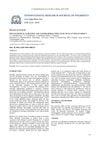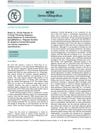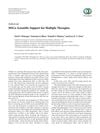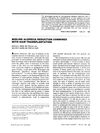 7 citations,
March 2011 in “Expert Opinion on Drug Safety”
7 citations,
March 2011 in “Expert Opinion on Drug Safety” Exemestane is effective and safe for treating certain breast cancers, with mild side effects, but needs more research on long-term effects.
 6 citations,
November 1996 in “Archives of Dermatology”
6 citations,
November 1996 in “Archives of Dermatology” G-CSF effectively treated a teenager's cyclic neutropenia and reduced her symptoms without adverse effects.
[object Object]  5 citations,
January 1987 in “Gynecologic and obstetric investigation”
5 citations,
January 1987 in “Gynecologic and obstetric investigation” Cyproterone acetate implants were more effective at reducing facial hair and improving skin in severe hirsutism than oral treatment.
 4 citations,
September 2017 in “International research journal of pharmacy”
4 citations,
September 2017 in “International research journal of pharmacy” Banana bract extract might treat bacterial infections and help reduce waste.
4 citations,
July 1983 in “Journal of steroid biochemistry/Journal of Steroid Biochemistry” Certain hormones can reduce skin oil and hair growth, potentially helping treat acne and excessive hair in women.
 2 citations,
May 2022 in “Horticulturae”
2 citations,
May 2022 in “Horticulturae” A plant protein biostimulant improved growth, photosynthesis, and nutrient content in hydroponically grown basil.
 2 citations,
April 2021 in “Canadian Journal of Urology”
2 citations,
April 2021 in “Canadian Journal of Urology” Five-alpha reductase inhibitors, like finasteride and dutasteride, can treat enlarged prostates, improve urination, reduce need for prostate surgery, and lower the risk of prostate cancer, but may increase the risk of higher grade prostate cancer. They can also treat male pattern baldness.

Belimumab effectively controls SLE disease activity and reduces steroid use.
1 citations,
November 2022 in “International Journal of Cosmetic Science” Lotus corniculatus seed extract reduces oily skin by decreasing sebum production.
[object Object]  1 citations,
November 2019 in “International Journal of Dermatology”
1 citations,
November 2019 in “International Journal of Dermatology” A 6-year-old girl with alopecia universalis regrew most of her hair after treatment with simvastatin/ezetimibe, minoxidil, and prednisolone.
 July 2024 in “Journal of Cosmetic Dermatology”
July 2024 in “Journal of Cosmetic Dermatology” Vegan collagen builder improves hair growth, skin smoothness, and reduces wrinkles and pain.
 August 2023 in “Gadua Journal of Pure and Allied Science”
August 2023 in “Gadua Journal of Pure and Allied Science” Ziziphus spina-christi leaf extract lowered blood sugar and protected organs in diabetic rats.
 December 2022 in “Cosmetics”
December 2022 in “Cosmetics” The food supplement improved hair growth and strength in people with a certain type of hair loss and had no major side effects.
 September 2019 in “Actas dermo-sifiliográficas/Actas dermo-sifiliográficas”
September 2019 in “Actas dermo-sifiliográficas/Actas dermo-sifiliográficas” Isotretinoin at low doses effectively treats facial papules in frontal fibrosing alopecia.
 April 2017 in “Journal of Investigative Dermatology”
April 2017 in “Journal of Investigative Dermatology” Triptolide effectively and safely reduces actinic keratosis lesions in mice.
 April 2016 in “Journal of Investigative Dermatology”
April 2016 in “Journal of Investigative Dermatology” Lithocholic acid helps hair growth and regeneration in alopecia by activating vitamin D receptors.
 September 2013 in “Neurodegenerative disease management”
September 2013 in “Neurodegenerative disease management” Teriflunomide is effective and generally safe for treating relapsing multiple sclerosis, reducing relapse rates and disability progression.
 29 citations,
November 2014 in “Experimental Dermatology”
29 citations,
November 2014 in “Experimental Dermatology” Injecting alpha-melanocyte-stimulating hormone in mice improved skin healing and reduced scarring.
 13 citations,
January 2015 in “Stem cells international”
13 citations,
January 2015 in “Stem cells international” Mesenchymal Stem Cells (MSCs) are promising for multiple therapies, but more research is needed to fully understand and optimize their use.
 2 citations,
March 2019 in “Lasers in surgery and medicine”
2 citations,
March 2019 in “Lasers in surgery and medicine” Higher light doses cause more damage to hair follicles, predicting better hair removal results.
 2 citations,
January 2010 in “Hormone Molecular Biology and Clinical Investigation”
2 citations,
January 2010 in “Hormone Molecular Biology and Clinical Investigation” Low dose finasteride decreases certain steroids, possibly increasing depression risk.
 80 citations,
December 2017 in “International Journal of Dermatology”
80 citations,
December 2017 in “International Journal of Dermatology” Low-dose oral minoxidil and spironolactone combo effectively reduces hair loss and improves hair density in women.
 74 citations,
January 2006 in “Endocrine journal”
74 citations,
January 2006 in “Endocrine journal” Low-dose gonadotropin treatment is effective for infertility in women with PCOS, leading to high ovulation rates and comparable pregnancy rates with fewer complications.
 40 citations,
December 1980 in “The Journal of Dermatologic Surgery and Oncology”
40 citations,
December 1980 in “The Journal of Dermatologic Surgery and Oncology” An improved scalp reduction technique reduces the need for hair grafts and has minimal complications.
 25 citations,
June 2013 in “Obesity Reviews”
25 citations,
June 2013 in “Obesity Reviews” Mesotherapy might help reduce fat in specific areas for those close to their ideal weight, but more research and care are needed to ensure safety.
 22 citations,
August 2019 in “Environmental research”
22 citations,
August 2019 in “Environmental research” Pseudomonas sp. T5-6-I bacteria increase selenium uptake in Brassica oleracea plants by 130%.
 5 citations,
March 1985 in “Head & Neck Surgery”
5 citations,
March 1985 in “Head & Neck Surgery” Combining scalp reduction and hair transplants improves coverage and appearance for male baldness.
 3 citations,
July 1987 in “Dermatologic Clinics”
3 citations,
July 1987 in “Dermatologic Clinics” Scalp reduction can treat severe hair loss, but success depends on scalp flexibility and it may cause complications like pain, infection, and cosmetic issues.
 September 2019 in “Journal of Investigative Dermatology”
September 2019 in “Journal of Investigative Dermatology” Abrocitinib at 100 mg and 200 mg daily may significantly improve moderate-to-severe atopic dermatitis in patients 12 years and older.
 36 citations,
November 1995 in “Clinical endocrinology”
36 citations,
November 1995 in “Clinical endocrinology” Low-dose flutamide helps reduce excessive hair growth and is even more effective with birth control, without bad effects on blood fats.




























